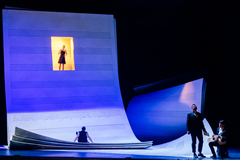| Opera Reviews | 26 April 2024 |
A warm-hearted and entertaining productionby Catriona Graham |
|
| Rossini: Il barbiere di Siviglia Théâtre des Champs-Elysées Edinburgh International Festival August 2018 |
|
|
Forswearing any attempt at realism, Laurent Pelly’s set comprises giant, curling sheets of manuscript paper, and the costumes are predominantly black; the chorus of men (Unikanti) at times is dressed in orchestral white tie and tails. Michele Angelini’s Count Almaviva is a young man, with a young man’s voice, at times of great sweetness. His top notes are exuberant shouts of joy, of glee even. He has followed Rosina to Seville, where her guardian Don Bartolo has brought her, to escape Almaviva’s attentions; Bartolo wants to marry her himself. She is a typical teenager, all attitude, and Catherine Trottman has a good line in petulant flounces – forgivable given the close confines in which she is kept by her guardian. Don Bartolo, however, is hardly the sharpest, for all his precautions. Peter Kálmán is impressive in his tongue-twisting patter-songs and manages to convey that he is somewhat behind the curve. His household staff are not as loyal as he thinks. The sneezing Berta (Julie Pasturaud) provides an acerbic commentary in her no-nonsense way and Stéphane Facco is pretty vacant as Ambrogio. Bartolo’s lawyer Basilio is sung by Robert Gleadow with lots of business adjusting his glasses, wiping his nose, generally incapable of standing still and not fidgeting. We first see Figaro descending from on high in a chair, just when Almaviva (who turns out to be his master) is despairing of his love. Guillaume Andrieux is a lively, puckish Figaro who could easily put a girdle round the earth in 40 minutes. His stance conveys scepticism, his face is an open book. The effort in ‘Largo al factotum della città’ is in his being here, there and everywhere. He reappears as the deus ex machina for the machinations in Act 2 and his exasperation with the lovers when they need to make their escape is palpable. The excellent ensembles are, no doubt, aided by the staging, which crowds them together whenever possible. The young singers of Unikanti have been well-drilled and it shows in their slick movement such as the byplay with music-stands and scores – the policemen brandish music-stands rather than swords. Lovers’ letters are on manuscript paper and lines of the stave also act as the bars Don Bartolo uses to imprison Rosina. When Figaro tells Almaviva to write to Rosina, he transcribes on the giant sheet the accompaniment played on guitar. The playing on period instruments of Le Cercle de l’Harmonie, conducted by Jérémie Rhorer, is crisp, the music tripping along lightly as befits this warm-hearted and entertaining production. In fact, rarely have I heard such ripples of laughter in the auditorium as for Angelini’s obsequious ‘Pace e gioia sia con voi’.
|
|
| Text ©
Catriona Graham Photo © Ryan Buchanan |

 Rossini’s Il barbiere di Siviglia opens the opera programme of the 2018 Edinburgh International Festival in a stylish production by the Théâtre des Champs-Elysées.
Rossini’s Il barbiere di Siviglia opens the opera programme of the 2018 Edinburgh International Festival in a stylish production by the Théâtre des Champs-Elysées.






